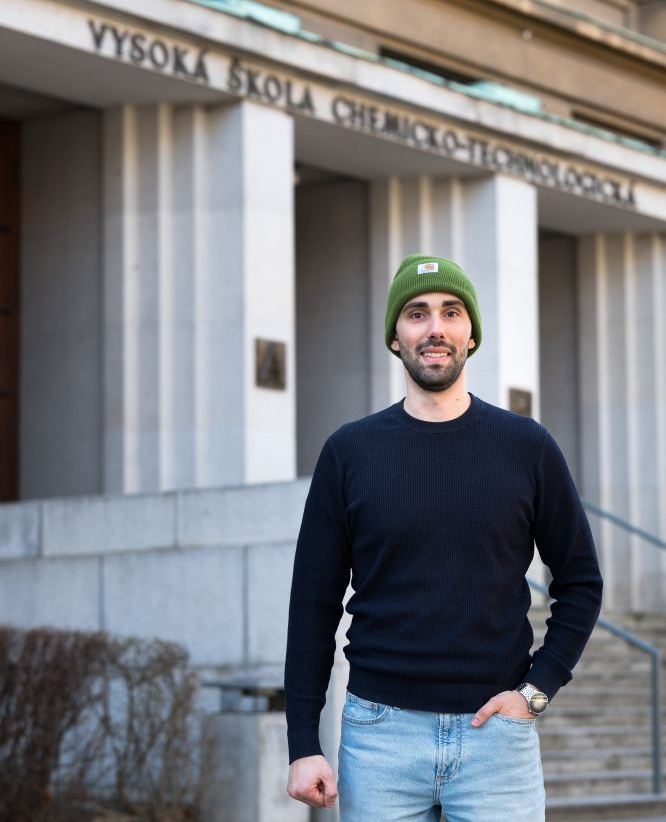
Francesco Mazzeo in collaboration triangle: UCT Prague, Politecnico di Torino and Eaton
Francesco Mazzeo is a PhD candidate at Politecnico di Torino, working within the Innovative, Electric, and Hybrid Vehicles research group. His research focuses on sustainable mobility and fuel cell technologies. As part of his doctoral studies, he collaborates with the University of Chemistry and Technology in Prague (UCT Prague), specifically with the Department of Inorganic Technology under the supervision of Associate Professor Martin Paidar and Dr. Martin Prokop. This partnership connects academic research with industrial applications, involving corporate partners such as Eaton, to advance fuel cell research and its implementation in transportation.
Could you provide an overview of your current research at Politecnico di Torino, particularly focusing on your work with the Innovative, Electric, and Hybrid Vehicles research group?
My research at Politecnico di Torino primarily focuses on sustainable mobility through the use of PEM fuel cell systems. Specifically, I am developing innovative health monitoring systems and algorithms for onboard, real-time heavy-duty applications, which require a thorough understanding of fuel cell powertrains and their modeling.
Your master's thesis involved developing a digital twin for Li-ion cell simulation. How has this work influenced your current research, and what advancements have you made since then?
My master’s thesis was instrumental in introducing me to the world of electrochemistry, which immediately fascinated me. In the DISAT labs at Politecnico di Torino, I assembled and tested coin cells, subsequently developing a predictive model of their performance and degradation. This experience not only strengthened my theoretical foundation but also helped me gain a deeper understanding of the internal phenomena governing batteries and electrochemical systems in general.
You have experience as a Testing and Validation Engineer at Maserati, working on the GranTurismo Folgore project. How has this industry experience informed your academic research, especially in the context of sustainable mobility and fuel cell technologies?
My professional experience was crucial in helping me understand how the working environment operates, the steps and challenges involved in executing an ambitious project, and how to effectively manage it through to completion. Additionally, working hands-on with vehicles featuring electric powertrains enabled me to refine and solidify my understanding of how these systems function.
Can you elaborate on your collaboration with Eaton and the University of Chemistry and Technology Prague (UCT Prague)? How do these partnerships enhance your research, and what unique perspectives do they bring?
I believe that working closely with an industry partner, if done properly, can greatly enhance a Ph.D. student’s research. With the initial support of Eaton’s engineers, we identified and tackled several issues impeding the commercial adoption of PEMFC systems for heavy-duty applications (e.g., large trucks). This effort led to a new technological concept aimed at extending the lifetime of such systems. Furthermore, thanks to the company’s expertise and resources, we were able to begin testing and collecting experimental data in collaboration with UCTP.
Working under the supervision of Associate Professor Martin Paidar and Dr. Martin Prokop from UCT Prague’s Department of Inorganic Technology, how do their expertise in electrochemistry and fuel cells complement your research objectives?
Associate Professor Paidar and Dr. Prokop are outstanding mentors in the field of electrochemistry and always have the right insights to help me interpret my research findings. Their expertise is invaluable in supporting me to broaden and refine the background knowledge of my doctoral work.
The integration of academic research with industry applications is pivotal in your field. How do you balance theoretical research with practical implementation, particularly in projects involving multiple institutions and corporate partners?
Academia and industry have two different approaches, yet they can, and indeed must, coexist to drive technological progress. In my view, the key lies in maintaining a shared vision and continuously validating theoretical insights against practical benchmarks. By doing so, we ensure that research remains both cutting-edge and commercially viable.
Given your involvement in teaching courses like 'The Future E-Mobility' at Politecnico di Torino, how do you perceive the evolving landscape of electric and hybrid vehicle technologies, and what role do you see yourself playing in this transformation?
I believe that our future will not be dominated by a single technology as it once was. Instead, a variety of powertrain solutions and alternatives will coexist, allowing individuals to choose what best suits their preferences and needs. In this transformation, I see myself as a bridge between research and real-world application: leveraging my background in electrochemistry and system modeling to develop innovative solutions that address both technical challenges (such as energy density, durability, and efficiency) and practical constraints (cost, manufacturability, and infrastructure).
What are the primary challenges you encounter during your reasearch activities, and how do collaborations with institutions like UCT Prague and companies like Eaton help in addressing these challenges?
The primary challenges I encounter in my research stem from the complexity of the systems I study and the need to integrate various scientific disciplines. I often find myself having to address problems that require specialized expertise in very different fields. Collaborations with UCT and Eaton are essential to overcome these challenges. Access to resources, infrastructure, and specialized expertise from these institutions allows me to broaden my knowledge and accelerate progress. Furthermore, it allows me to subject my results to critical review by experts in the field, thus increasing their reliability.
Could you share any recent publications or findings from your research that you find particularly impactful, especially those that have benefited from your international collaborations?
We will present a selection of our work at the SAE World Congress, one of the world’s largest automotive conference, taking place in Detroit, USA, in April 2025. We will discuss some of our key findings, particularly those relevant to heavy-duty applications. Additionally, we are preparing journal publications in collaboration with UCTP.
Looking ahead, what are your aspirations for your research and career?
My first goal is to complete my Ph.D. as successfully as possible. After that, I’m not entirely sure which career path I want to pursue. I’m interested in both continuing in academia and working in industry, and I’ll need to evaluate whatever opportunities come my way.
How did your collaboration with UCT Prague come about, and what motivated you to work with the university?
I learned about UCT Prague during my time at the Eaton European Innovation Center, which had already collaborated with the university. After seeing the high quality of their joint projects and the excellent facilities, I thought it would be the ideal place to spend a research period and advance my doctoral work. I therefore asked the company to put me in touch with Associate Professor Paidar, to whom I proposed several research topics. With their approval, I was warmly welcomed into the research group and given access to their laboratories to carry out my activities.
What has your experience been like working with Associate Professor Paidar and Dr. Prokop as your supervisors? How has their guidance influenced your research?
Associate Professor Paidar and Dr. Prokop have been outstanding mentors. Drawing on their expertise, they guide me in designing the experiments we plan to conduct and offer substantial support in interpreting the results. Working under their supervision has helped me grow professionally and deepen my understanding of electrochemistry.
How do you find the academic and research environment at UCT Prague compared to Politecnico di Torino?
I haven’t taken any classes at UCT, so I can’t speak to the academic aspect. However, from a research perspective, the two universities are quite different and therefore not directly comparable. Politecnico di Torino is much larger in terms of facilities and student population, whereas UCT has smaller laboratories that are nonetheless managed very intelligently and efficiently. Both institutions are excellent, and I believe they rank among the best in Europe in their respective fields, supporting high-level research and producing notable results.
Have you had the chance to engage with other researchers or students at UCT Prague? How have these interactions enriched your work or provided new perspectives?
Yes, I share the lab with other Ph.D. candidates and master’s students. It’s wonderful to be in an environment where everyone is working on related topics, because you can significantly enrich your technical and cultural knowledge through daily interaction, effectively learning at twice the pace.
What do you see as the most valuable aspect of the collaboration between UCT Prague, Politecnico di Torino, and Eaton?
Having had the opportunity to attend three different institutions, I was able to directly observe the working dynamics of each and identify substantial differences between academia and industry, as well as among various research groups. This experience allowed me to acquire a broader and more critical perspective on the diverse approaches to research and work, overcoming the limitations of a too circumscribed context.
Would you recommend UCT Prague as a research destination to other international PhD students? And why?
Yes, I would definitely recommend it to others. The university offers a great environment with plenty of laboratories and hands-on lessons. In addition, Prague is a vibrant, multicultural city that’s wonderful to live in, especially for students.
Looking back on your time in Prague and at UCT Prague, how has this collaboration shaped your personal and professional development?
My first experience abroad, albeit temporary, allowed me to broaden my cultural and linguistic horizons, particularly perfecting my English language skills. Moreover, the time spent at UCT enabled me to deepen my knowledge in the field of electrochemistry and hydrogen, thanks also to the supervision of Associate Professor Paidar and Dr. Prokop, who have provided me with valuable guidance in the use of non-invasive characterization techniques.
Living and working in Prague as part of your collaboration, what aspects of the city and Czech culture have stood out to you?
I’ve found Prague to be a fascinating place to live and work. The architecture is breathtaking, and I’ve also enjoyed exploring local cuisine, especially dishes like svíčková and medovnik. The city is very clean and safe, and its public transportation system is exceptionally efficient, making it easy to get around for both work and leisure.







